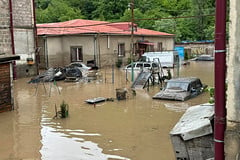
Thousands of years ago, the eastern coast of Eritrea was home to one of the world’s most important port cities.
Adulis was originally a small village, and folklore says that its name means “free people” because slaves would settle in the city after escaping Egypt, according to the Eritrea Ministry of Information. Eventually, the city became a trade center along the Red Sea, facilitating imports and exports with Egypt, and the Greek and Roman empires, the Miami Herald reported.
Today, the port city is buried — but that hasn’t stopped archaeologists from attempting to uncover the secrets of the ancient hub. Since 2011, experts have been working to excavate the city.
The newly discovered ceramics date to between 1500 B.C. and 500 B.C., officials said.
The ceramics are significant because they bridge previous historical periods and findings at the site, Tsegay Medin, the project’s coordinator, said in the ministry’s release. The discovery has the “potential to significantly enrich the history of the country and the region with thorough research and study.”
During the peak of the powerful Aksum empire in northern Ethiopia — between about the third and sixth centuries A.D. — Adulis connected the empire to other ancient civilizations, the ministry said. Between 220 A.D. and 589 A.D., Adulis even established trade relations with China.
The city was invaded by Arabs around 640 A.D., and by the time the Aksum empire fell in the seventh century A.D., the city was destroyed, according to officials.
Eritrea is on the northeastern coast of Africa. It borders Sudan, Ethiopia and Djibouti.
















